I remember when my 4 year old once came from the Friday prayer all red in the face, she was crying tears upon tears. She said she didn’t want to go to jummah because it was so hot. So I hugged her and told her the following hadith:
The Prophet (ﷺ) said, “Seven (people) will be shaded by Allah by His Shade on the Day of Resurrection when there will be no shade except His Shade. (They will be), a just ruler, a young man who has been brought up in the worship of Allah, a man who remembers Allah in seclusion and his eyes are then flooded with tears, a man whose heart is attached to mosques (offers his compulsory congregational prayers in the mosque), two men who love each other for Allah’s Sake, a man who is called by a charming lady of noble birth to commit illegal sexual intercourse with her, and he says, ‘I am afraid of Allah,’ and (finally), a man who gives in charity so secretly that his left hand does not know what his right hand has given.” [Bukhari]
I didn’t tell her the complete hadith, but I told her that she can choose to not go again if she doesn’t want to, but that she will be rewarded for today (in shaa Allah). Because Allah loves the little people who love to worship Him. I told her that you went to worship Him in this heat with Baba and Allah will give her His shade when no one else will be shaded. And just like that, she wanted to go to the mosque again (with better summer prep). After the week passed and Friday came again, before going to Jummah with Baba, she asked me if she was going to be under the shade of Allah if she goes in such heat? I smiled and said “in shaa Allah” – we hope for the best of reward after giving our best.
Word by word analysis of the hadith
The word شَابٌّ in the hadith comes from the root words ش ب ب – which means to burn, blaze (fire), youth, outbreak (of a war), ignited, youngster etc. It shows how young people are strong in body and passionate in emotion. Youth is a time of exploration where there aren’t many family, financial, and civic responsibilities; but they have the time, energy and health to develop skills and grow in knowledge. It’s the time when you’re in a position to lay a foundation for the rest of your life. In the era of the Prophet (ﷺ), young people were military leaders, Quranic scribes, mu’adhin (those who announce the call to prayer (adhaan)) and even scholars. They were not seen as a bunch of immature people, but an opportunity for an ummah to grow stronger.
The next word نَشَأَ in the hadith comes from the root words ن ش أ – which means to raise, become elevated/high, grow up, create/produce/originate, crop up, spring out, develop, nourish, evolve, to build, construct, upbringing etc. This word is also used in terms of growing plants in the Quran. Perhaps because growing plants feels so much like raising kids sometimes. If you don’t know the plant – its roots, its nature (fitrah) – you can never tell if what you’re doing is enough…Too little sun won’t let it grow thick. Too much sun could dry it out. Too little water would make it wilt. Too much water would turn it all soggy. Too little soil won’t let it take its roots. Too much soil won’t let it stem up. Too little care may halt its growth while too much maintenance may stop its shoots as well…So you’re constantly spinning in this spiral of doubt. But what’s beautiful is that you can almost always revive a plant. If you slipped through the cracks in the past, you can almost always fill them in. If you neglected it in the past, you can cut the wilted parts and start anew. It’s almost never too late. Because even though you, as a caretaker of it, aren’t perfect – but the true Caretaker is the One Who is Perfect. Who knows better than you and I…
عِبَادَةِ اللَّهِ means that the child is fulfilling the obligations (of tawheed, prayer, fasting etc.) and understands that his core purpose of life is to worship Allah. The child understands the Quran – hence the commandments of Allah and His messenger ﷺ. So here are the few points to keep in mind when nourishing your buds that will hopefully grow under the shade of Allah in aakhirah (day of judgement) in shaa Allah.
It starts with you – educate yourself and just do your best
“O you who have believed, protect yourselves and your families from a Fire whose fuel is people and stones, over which are angels, harsh and severe; they do not disobey Allah in what He commands them but do what they are commanded.” [Quran 66:6]
Let the little ones observe you while you read Quran, pray salah, make dua etc. The most valuable lessons are learned in a way that is natural and real. If you read Quran on mobile, try shifting to a mus’haf (printed copy) to be an example in front of kids. If you pray when kids are asleep, try praying where they are playing around you so they can perhaps join in too or watch you pray at least. If you are afraid to shed tears while making dua around them, let them witness the beauty of vulnerability in front of the Lord. Even though you may feel like your eemaan has been affected by parenthood and you’re unable to do all the things that you used to do before kids, know that whatever you are doing right now is bringing you double the benefit (in shaa Allah). So even little suffices. Educate yourself in deen so you can be there for your kids in the time of need, so you can make every opportunity a learning one, so you can be the compass to guide them in a right direction whenever they go astray.
Take advantage of their fitrah when they are young
Fitrah comes from the root word ف ط ر which means to create out of nothing, to leave/split/crack/break, natural disposition or constitution with which a child is created. The faculty of knowing God and capability of accepting the religion of truth.
I remember the time my 4 year old asked me if Allah taala was circle? (Based on a hadith that we will see Allah in Jannah as easily as we see the full moon in this world. I think she was referring to the shape of a full moon). And I answered her that we’ve never seen Him so we can’t really say. Upon which she said: “but He made us so we must have seen Him”. Her question reminded me of the following hadith at that moment which I narrated to her in the following words for the ease of understanding:
“Every child is born in Islam” – it means that promise which Allah had taken from us – when He said : “Am I not your Lord? And we all said: Yes!
This innate desire to follow our Rabb is termed as fitrah as well. We are all born with it hence moral instincts arise on their own in kids. But just because kids are inclined towards their natural disposition when they’re young doesn’t necessarily mean they’ll grow up to be the same. That’s where the parents come in – they can teach their child to channel that natural desire and conscience in a productive way. The more it gets buried, the harder it will be to resurrect it.
Make the foundation of Islam strong by making it interactive and immersive:
Multiply yourself by raising the next generation of worshipers who carry on — even further than you were able to.
“And enjoin As-Salat (the prayer) on your family, and be patient in offering them …” [Quran 20:132]
The role of religion has diminished in this world, and people are becoming increasingly secular. So parents are now looking for Islamic products that can compete with the ones in the secular market. Things that constantly pull the children away from their core values. People may push their children to pray five times a day. But if they don’t believe, going through the motions of religion won’t give them any of its pro-social and developmental advantages. So let them CHOOSE Islam, but make sure that you help them choose it. Make sure you remind them to choose it. Make sure you provide them the valuable resources so they can choose it. Just make sure you try your best and give them the Islamic environment to breathe in!
I’ve been using MY SALAH MAT with my children for a year now and my sister has been using it with her children too (especially now that her eldest is turning 7 and she is even more concerned about the regularity of prayers). I’ve also downloaded the adhaan app that announces the call to prayer at the prescribed time, which signals the kids that it’s time to leave everything and get up for prayer. They spread their “my salah mat” (the younger ones forget to do wudu most days 😅) and stand up for prayer alhamdulillah (the one year old goes straight into sujood while saying “Allaaaah abbbaaaa” (Allahu akbar) 🤣)
Get to know your child – spend quality time with them
The start and end of the day is the time when I feel kids really open up and using that time to bond with them can create really good connections and conversations. If you are tired by the end of the day, try it first thing in the morning – instead of rushing for breakfast or bath etc., take your time in asking them if they saw a dream (how Prophet (ﷺ) used to ask his companions) or even read books together (especially if you didn’t get to read them at night). The day goes by much more smooth like that. Kids are more sane throughout the day if they’ve had good quality time with their loved ones in the morning. Or when you recite the waking-up dua, you can also thank Allah for other things. Since the waking-up dua starts with alhamdulillah, the conversation goes forward with the same flow. For eg: Alhamdulillah that Allah brought us back to life after taking our soul for a short amount of time. Also alhamdulillah for such a nice weather. Alhamdulillah for hugs and kisses from you (the child). Alhamdulillah for a great start to a day. You can mention simple things like that. Or you can take a step further and fill a gratitude journal together. I personally read through #AlhamdulillahForSeries with kids for a positive boost if they feel a little grumpy in the morning ❤
Quality time WITH or FOR someone you love are two very different things. Constantly serving our children doesn’t leave any space for quality time with them so try to keep things simple. For eg: It’s OK to let them eat simpler foods instead of fancy ones so you can take time out to be WITH them instead of constantly doing things FOR them. The more time you spend with them, the more you’ll get to know them. The more you’ll know your child, the more you’ll know the solutions that work with them. Not every child is the same and hence as a parent, you are a perfect barometer to judge what works and what doesn’t – which is a constant trial and error method.
Go often to the mosques that welcome young kids:
Some people may have fear of going to mosques with kids because some people may not understand why a child – who doesn’t know how to pray – is there playing or mimicking everyone’s moves. Or just crying. I know it can be a hindrance sometimes. I’ve brought my kids to mosques with me at least once a week (on Friday) since the time they were little babies. I’ve been through all those stages – where kids are constantly crying – so much so that the khateeb has to mention it after the khutbah (real story). Where kids are constantly playing and not understanding your gestures (because you can’t talk amidst khutbah) and you eventually get scolded by someone who brands you as a bad mother. All of that did make me question myself – why did I even come here! But the answer pulls me back every single time. So they can love this place and have their hearts attached to it. They eventually learned how to behave in the mosques but it took time and constant reminders. It didn’t happen overnight. If I had given up after being scolded or ridiculed, my kids would have been deprived of the beautiful experiences they had in the mosques.
Encourage God-consciousness instead of emphasizing on “what will the people say”:
Prophet (ﷺ) said to Ibn Abbas (RA – who was a young boy at that time): “…remember that if all the people gather to benefit you, they will not be able to benefit you except that which Allah had foreordained (for you); and if all of them gather to do harm to you, they will not be able to afflict you with anything other than that which Allah had pre-destined against you…Remember that the Help of Allah is obtained with patience, and relief emerges after distress, prosperity follows adversity, and hardship is followed by ease”. [Riyad as-Salihin]
The best thing any Muslim parent can ever teach their children is to emphasize, from the day they can comprehend, that Allah is One and no one is worthy of worship except Allah. When we say that Allah has no equal, then our actions should speak louder than our words. If we are constantly worrying about “what will the people say” instead of “what will Allah say”, we are giving the power of influence to people instead of Our Creator. The reason we do good things, is for the pleasure of Allah – not the people. If worldly benefit comes out of it, then we say alhamdulillah. If there’s no worldly benefit in it, we keep doing it regardless because we did it for Allah in the first place. And a reward from Him is never lost. It’s such an important concept to teach kids so they don’t just follow the crowd, but they learn to stand up for what they believe in – even if they are the only ones standing. Which brings me to the next point.
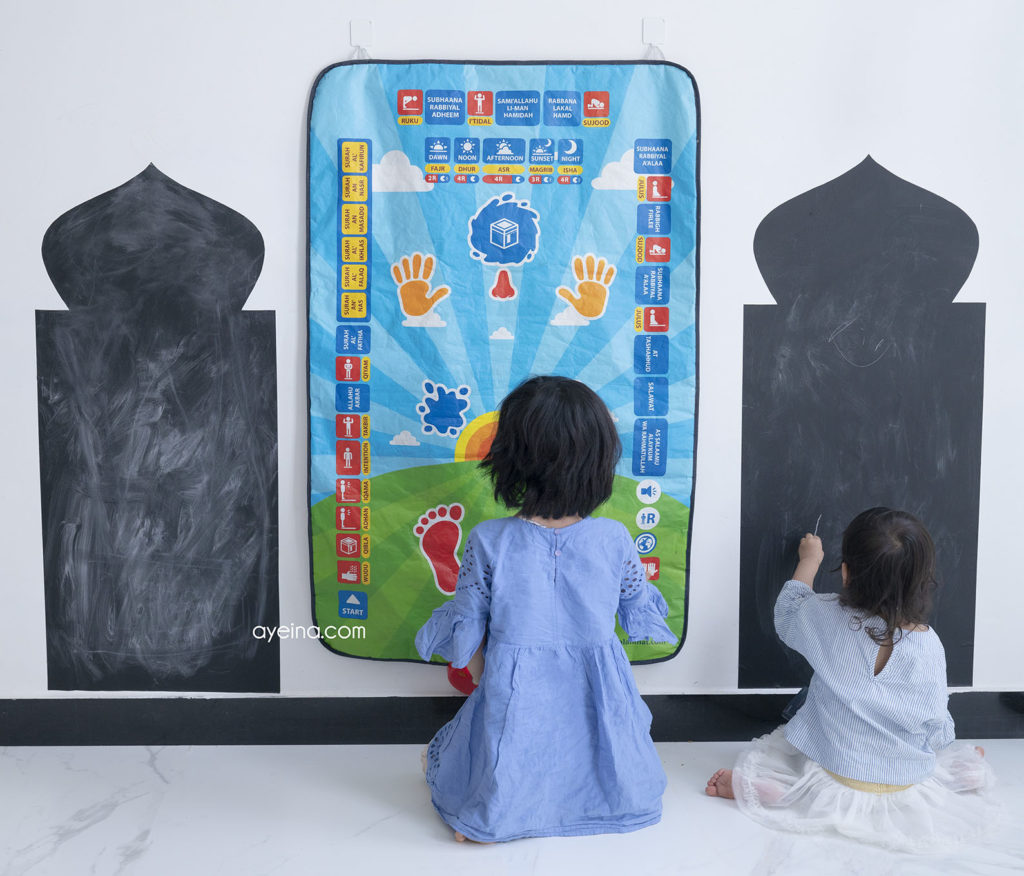
Righteous company makes it easier to practice Islam without the fear of judgement or mockery
Abu Hurairah (May Allah be pleased with him) reported:I heard the Prophet (ﷺ) saying, “Man follows his friend’s religion, you should be careful who you take for friends”. [Riyad as-Salihin]
Suhba (companionship) will make you or break you. When you sit with the people of dunya, you become a drop in their ocean, but when you sit with the people of akhirah (Hereafter), the dunya becomes a drop in your ocean. Our friends may eventually change when our opinions and beliefs change because we often become parts of the people we spend time with. Even if you think that someone’s negative influence is not impacting your life, it’s a safe zone to not enter the fitnah space. As a parent, you can keep an eye on who your kids play with or who are they spending time with (be it their caretakers at school etc.). Of course, you can’t provide a perfect environment to your kids everywhere (after all, we ourselves aren’t perfect), but in their tender ages, it’s a safer option to keep an eye on what they absorb from their company.
I remember the time when I sent my daughter to a Quran class where a supervisor was constantly backbiting about her in-laws (day in and day out). I used to cringe at the questions my daughter used to ask me (referring to the language the supervisor used). So I mustered the courage and talked to the head about it who said that such behavior was not acceptable in a Quran class. So take an action if you have to. Keep talking to your children so they can share with you what they go through – what they see, what they hear, what others do etc.
Set boundaries with love of Allah first (instead of His fear)
I remember the time when my 4 year old said: “When I am sad, I close my eyes and then I get happy.”
I asked her: “What do you see?”
She said: “I see (imagine) Allah ta’ala and then I get happy because I love Allah ta’ala.”
I prayed at that moment that this love of Allah only multiplies and never diminish. Since me and my daughter have started our jannah discussions at night, it has really helped her fall in love with Allah. So much so that I then made a whole journal around the topic to involve all her senses into imagining the beauty of it.
I haven’t introduced hell fire to her yet, but perhaps by the time she turns 5 or 6, I will introduce that as well. Before I could introduce fear of Allah, I tried to focus on love – which naturally sometimes lead to fear because we are afraid of losing our loved ones – disappointing them genuinely hurts us so we try to stay on the safe side. So it’s OK to take it slow and steady till you see that they love Allah beyond everything and everyone (at least they should be able to say it and believe it – even if they sometimes forget to truly act upon it). Kids want their parents to set limits and be authority figures, even if they won’t admit it. There will come a time when we all have to let go, but in shaa Allah your children will always remember their root values once they’re out on their own.
List of Surahs to Skip from Juz Amma if You Don’t Want to Introduce Hell Fire to Kids Yet:
Just to avoid the concept of hell at such young age, we skipped a couple of chapters like surah masad etc. that talked about hell fire in our memorization and understanding of Juz amma (30th para) of the Quran. Last part of the Quran is all about afterlife so if you’re starting your child with the end of the Quran, perhaps you might want to stick to the following 16 surahs (if you want to avoid the topic of hell as well – which you may introduce later on when you think your child is ready):
Naas (114),
Falaq (113),
Ikhlas (112),
Nasr (110),
Kafirun (109),
Kawthar (108),
Ma’un (107),
Quraish (106),
Feel (105),
Asr (103),
Adiyat (100),
Qadr (97),
Teen (95),
Sharh (94),
Duha (93),
Shams (91)
Some kids might be ready for such information by the age of 5 or 6. Or even earlier. You are the barometer for your own child ⚖ For eg: My almost-7-yr-old niece has detailed knowledge of life after death. She’s actually quite fascinated by the stories of dajjal, yajuj majuj etc. (she’s in that phase of life where she loves horror stories 🤷🏽♀️). Following are the surahs from juz amma that talk about punishment of hell fire etc.
Surah masad/lahab (111),
Humazah (104),
Takathur (102),
Qariyah (101),
Zalzalah (99),
Bayyinah (98),
Alaq (96),
Layl (92),
Balad (90),
Fajr (89),
Ghashiyah (88),
A’la (87),
Tariq (86),
Buruj (85),
Inshiqaq (84),
Mutaffifin (83),
Infitar (82),
Takwir (81),
Abasa (80),
Naziat (79),
Naba (78)
21 surahs in Juz Amma talk about hell and punishment of aakhirah etc. While 16 are open ended surahs.
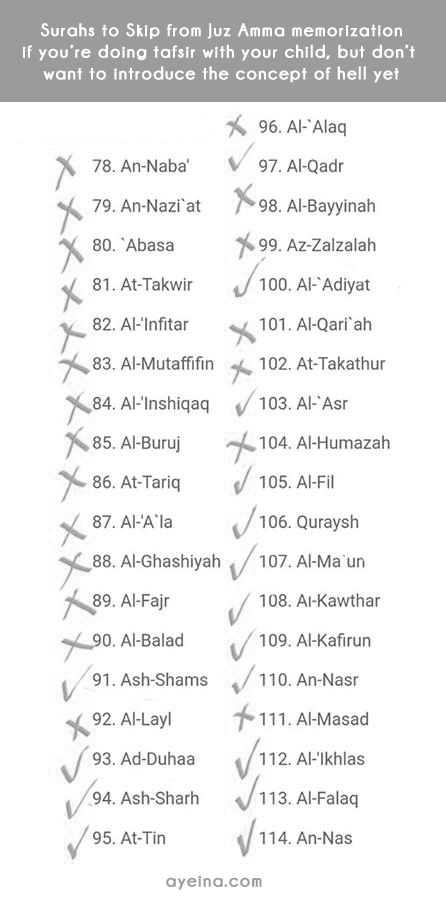
Instill mindfulness in kids and avoid useless media consumption
Ibn ‘Abbas (RAA) narrated, ‘One day I was riding behind the Prophet when he said, “O lad, be mindful of Allah and He will protect you. Be mindful of Allah and you shall find Him with you. When you ask (for anything), ask it from Allah, and if you seek help, seek help from Allah.”
Right now, the difference between right and wrong is so clear in their eyes; they really get it when we explain what’s what to them. The entertainment industry’s depiction of what’s ‘normal’ manages to confuse adults, so just imagine what it does to children! We can’t protect our kids from everything bad of course, but it is for that very reason that the home must be an oasis where Allah is remembered and obeyed, where children can relax and feel cherished, where they can practice their religion without feeling apologetic or alien. The home environment should be as halal as possible, so if you can, get rid of the TV so you won’t have to constantly fight the battle of temptations. It will also help you not waste any time and model productive living. The more we keep rushing, the more we bury the tiny voice of our conscience. So give them time for reflection and do not fill their time with constant activities or chores. Let the kids get bored sometimes. Let them invent their own play. They will learn to ponder and eventually become “ulul albaab” (people of sound mind – that can free itself from distractions).
From a young age, Ibrahim (AS) recognized that the wood and stone “toys” that his father sculpted were not worthy of worship. He used to contemplate about the natural world such as the stars, moon, and sun. He realized that there must be only One God who created all of this world. So kids who are not afraid to be alone with their own thoughts are those who eventually reach that decision even if no one tells them that. They can truly connect to their fitrah if they stay mindful and present. It’s OK if they don’t read 1000 books or know 1000 skills, but it’s not OK if they don’t even know themselves and their Lord – something that requires an un-busy mind and body.
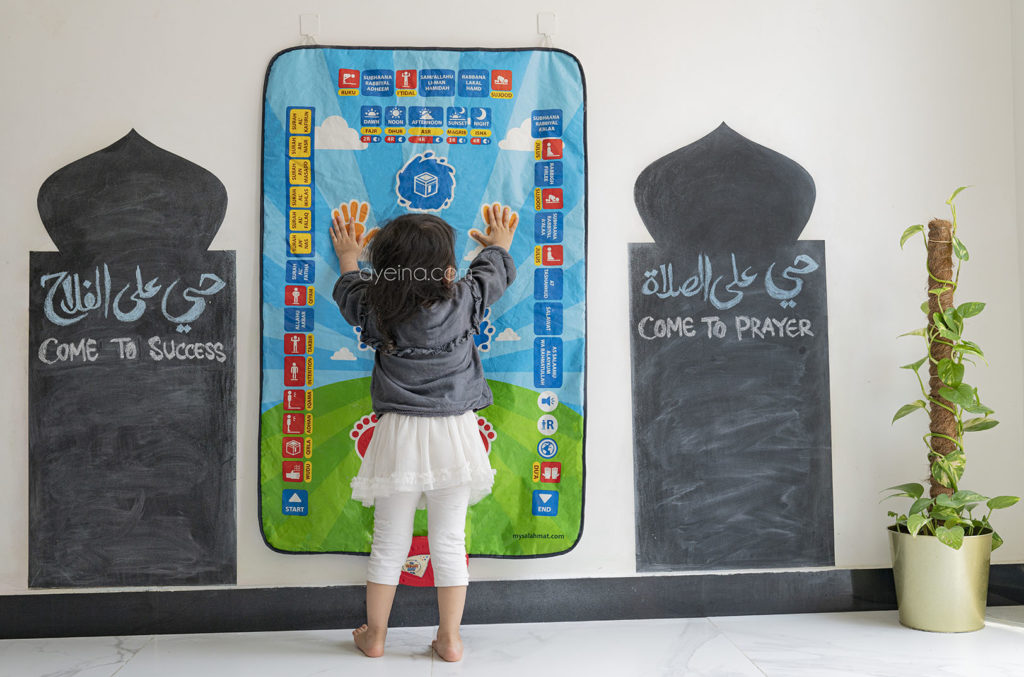
Stay patient through the process and keep making dua:
Messenger of Allah (ﷺ) never hit anything with his hand neither a servant nor a woman but of course, he did fight in the Cause of Allah… [Riyad as-Salihin]
Couples who are about to embark on the path of parenthood should ask themselves, “Why do we even want children?” and those who already have them and they lose patience should ask themselves the same question: “why did we have children in the first place”? Was it to gain some worldly benefit or to gain sadaqah jaariyah in the hereafter? Renew your intentions on a daily basis and whenever you lose your hope and patience, remember your WHY and keep your eyes on the goal while never underestimating the power of dua. Here is a free printable list of duas for righteous children by AYEINA:
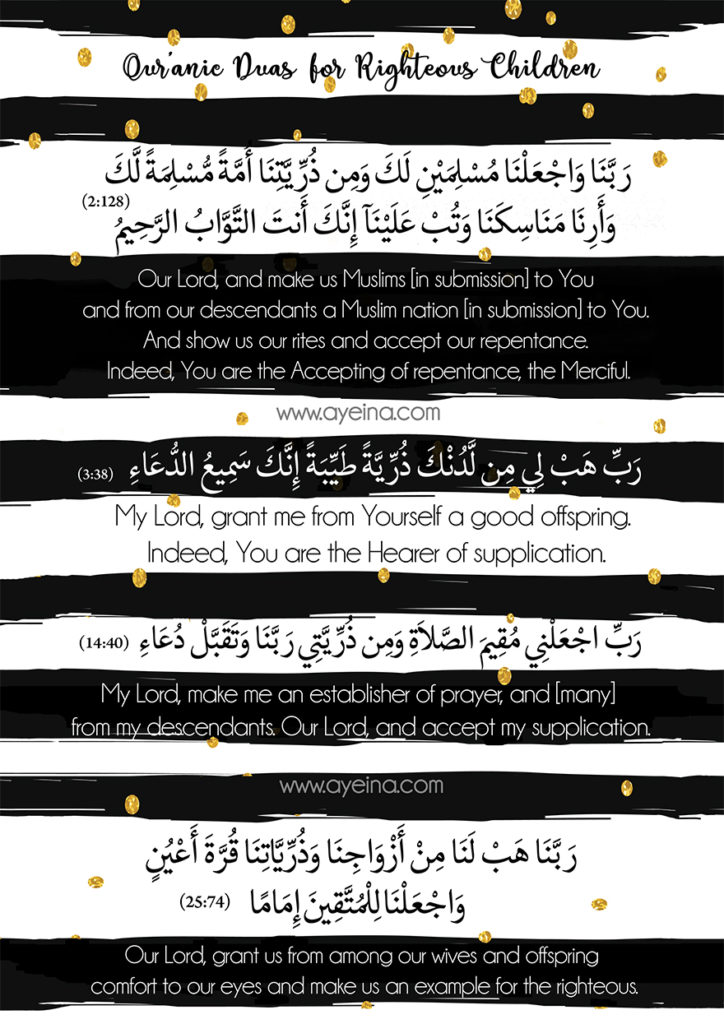





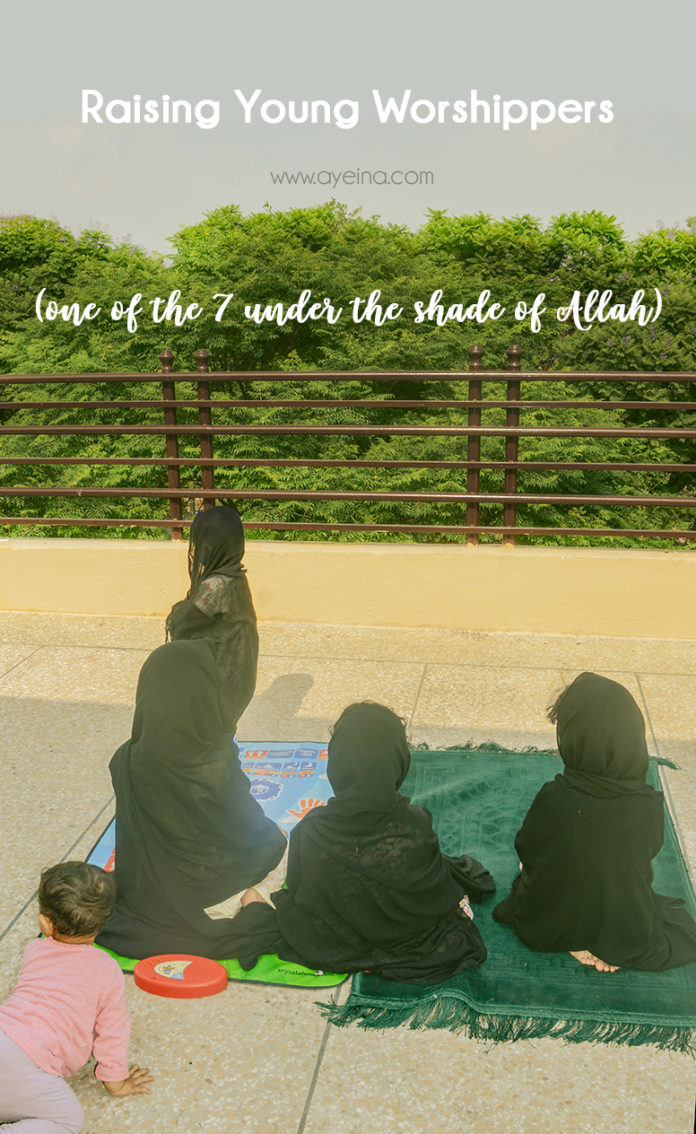
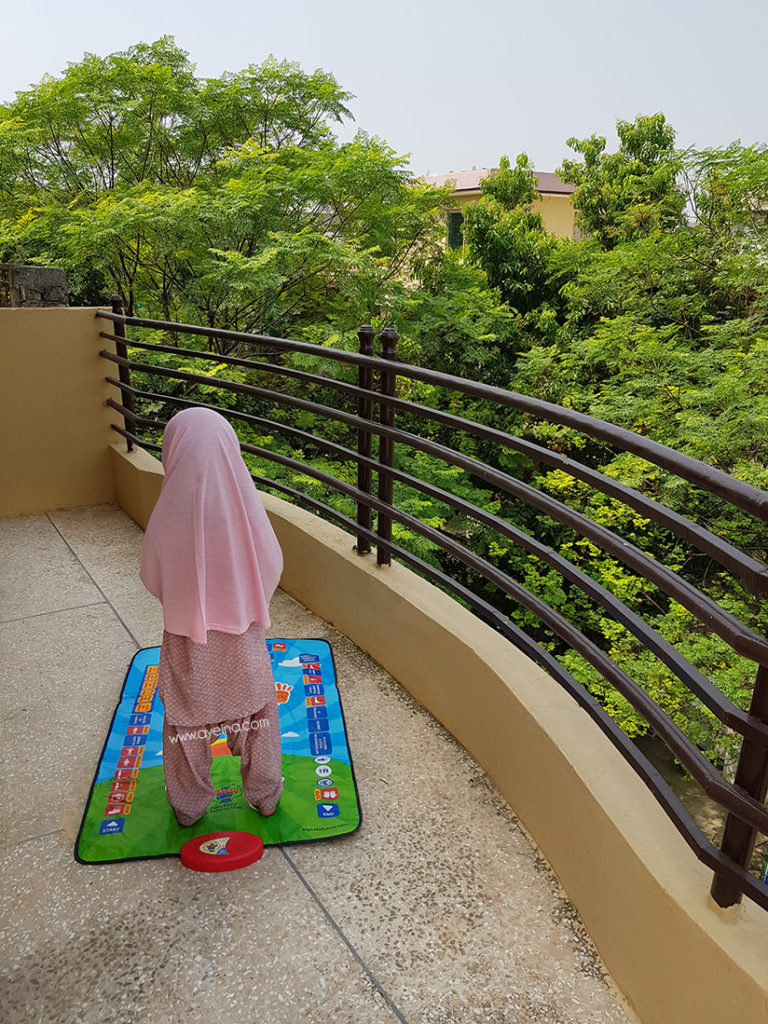
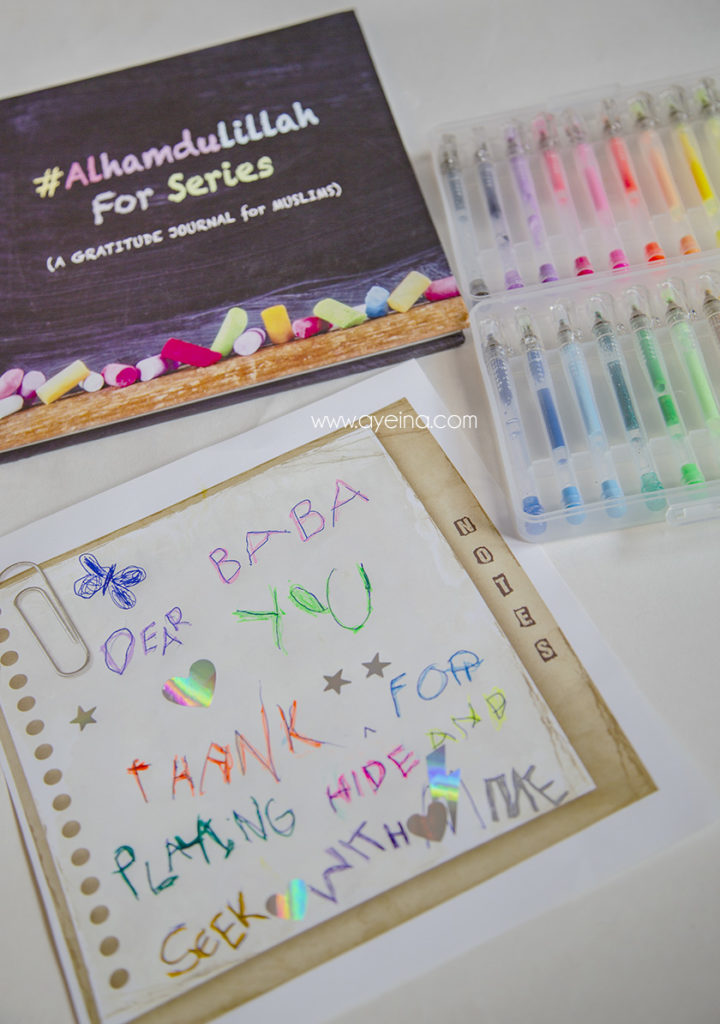
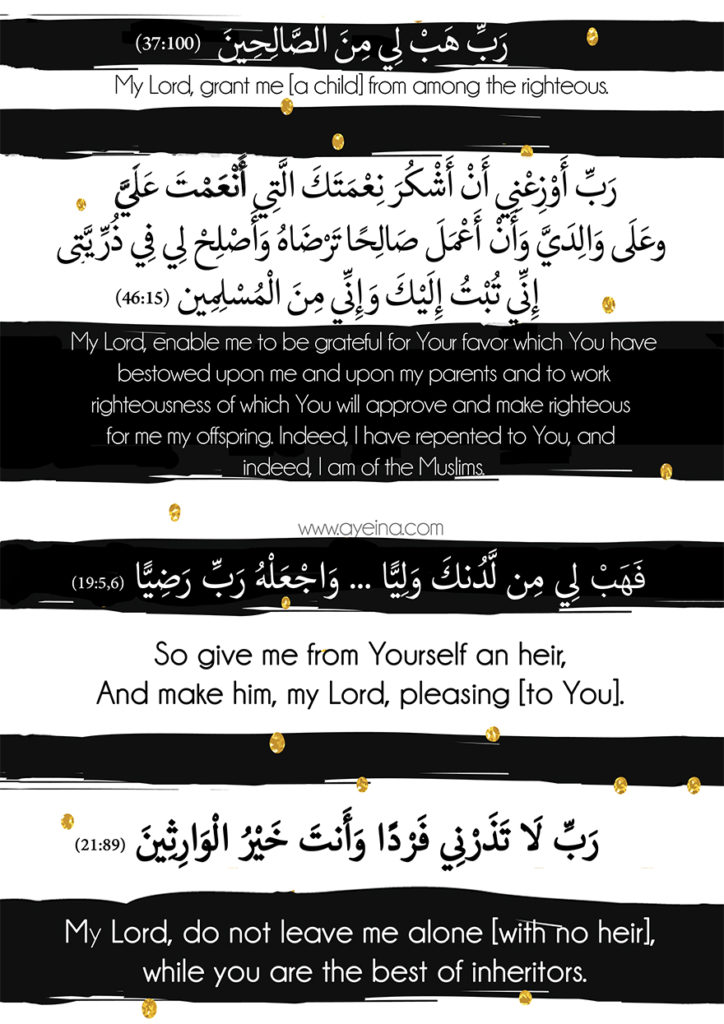

Mashallah what a lovely Muslimah so passionate about praying in the mosque. What an interesting point about children’s fitrah being naturally towards Islam and Allah. I agree as I often see children imitating their mothers during prayers. It’s a wonderful sight.
The gratitude novel sounds like a great idea and so great of you to always bring your children to the mosque despite having doubts. I agree. Even as an adult, one should be bored occasionally so that they are alone with their thoughts.
Beautifully written and highly intellectual post. I enjoyed reading every bit of it. Mashallah you’re a lovely mother.
May Allah make e better than what you think of me. I’m as flawed as any other human being. And yes, alhamdulillah for children’s fitrah that we only have to nurture, instead of growing from scratch!
This: The role of religion has diminished in this world, and people are becoming increasingly secular.
This is very true sadly.
Agree with you that it is so important to instil the love for Allah first…sadly have seen it so much where parents try to frighten their kids into behaving and it usually backfires.
I have always loved posts on ayeina.com n this one isn’t an exception!
Jazakillahu khair for sharing. There are so many points I just want to write on my home walls! Especially the one about spending quality time WITH our children as opposed to doing things for them. I feel living in west, where I have to do a-z work myself it is so easy to give up on spending quality time with our children 🙁
We ourselves end up judging how good of moms v r based on how many times we gave our kids freshly made food from scratch :/
Jazakillahu khair for reminders. Surely needed them.
Very insightful as always! All of the points resonated with me. Especially last one about mindless use of media. May Allah SWT guide us all to raise our children in a way that’s pleasing to Him. Ameen ♡
Assalamu aleykum,
Jazakillah khayr. This is a very useful article for all mums.
The advice to teach children to love Allah first and foremost is very important in my experience. We should talk to young kids about Jannah every day. I agree that we do also have a duty to bring them to fear Allah subhanahu wa ta’alaa when they are ready, but in my experience this is not until around the age of seven, when they start regularly reading their prayers and their Taqwa starts to grow. The list of surahs referencing Jahannam is very helpful and we should use it to help our older kids understand the reality of the Fire and instill in them a fear of displeasing Allah. By the age of ten, our kids should know all about the different levels of Jahannam, its occupants, its food and drink, even the details of the punishments that Allah has prepared there for those that disobey Him. They can then use this to motivate themselves to live a life of humility and obedience in the service of Islam in sha’Allah.
The advice on ensuring our kids keep righteous company is vital too, and everything we can to encourage them to be mindful of Allah subhanahu wa ta’alaa every hour of every day will help them develop as young Muslims and bring barakah to the parents too in sha’Allah.